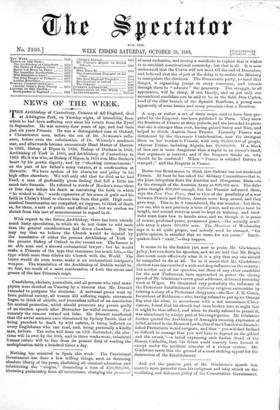It seems to be the fashion just now to praise
Mr. Gladstone's policy, but run down his speeches, and we are told that Mr. Bright does much more effectively what it is a pity that any one should be compelled to do at all. To us it seems that Mr. Gladstone's election tour has exercised a wide and deep influence on the country; but neither any of his speeches, nor those of any other candidate for the new Parliament, have approached in power the closing speech of Mr. Gladstone's seven great addresses, delivered yesterday week at Wigan. He illustrated very powerfully the influence of the Protestant Establishment in inflaming religious animosities by relating a story of a Protestant clergyman—the Rev. J. R. Green, Incumbent of Kildertou—who, having refused to put up an Orange flag over the altar, in accordance with a not uncommon Ulster custom, found that his church had been broken into at night that it might be thus affixed, and when he finally refused to permit it, was abandoned by a large part of his congregation. Mr. Gladstone further quoted the Archbishop of Armagh's amazing expression of belief, uttered in the House of Lords, that if the Church was disestab- lished Protestants would emigrate, and then "you will find Ireland so difficult to manage that you will have to depend on the gibbet and the sword,"—a belief expressing such foolish dread of the Roman Catholics, that his Grace could scarcely have formed it except under the artificial stimulus of a vicious system. Mr. Gladstone made this the ground of a most striking appeal for the destruction of the Establishment.






























